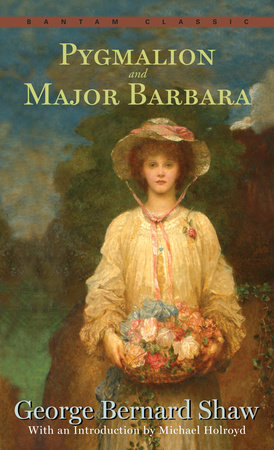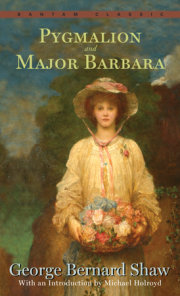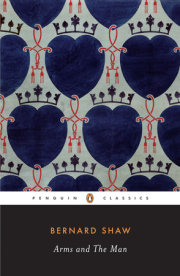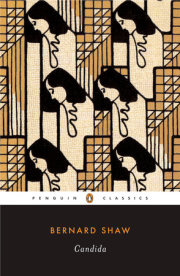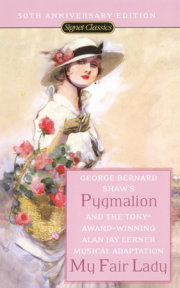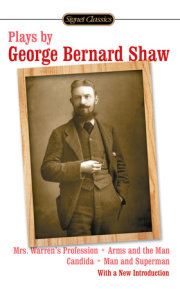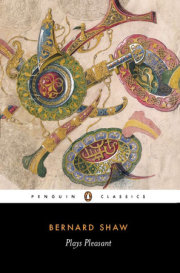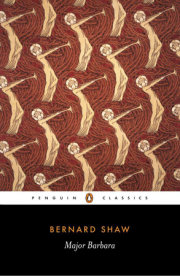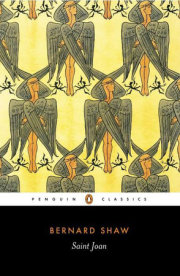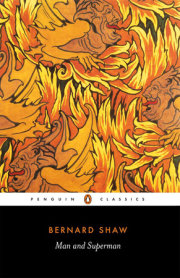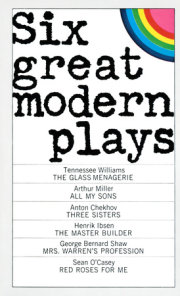Major Barbara
ACT I(It is after dinner on a January night, in the library in LADY BRITOMART UNDERSHAFT's house in Wilton Crescent. A large and comfortable settee is in the middle of the room, upholstered in dark leather. A person sitting on it (it is vacant at present) would have, on his right, LADY BRITOMART's writing-table, with the lady herself busy at it; a smaller writing-table behind him on his left; the door behind him on LADY BRITOMART's side; and a window with a window-seat directly on his left. Near the window is an armchair.
LADY BRITOMART is a woman of fifty or thereabouts, well dressed and yet careless of her dress, well bred and quite reckless of her breeding, well mannered and yet appallingly outspoken and indifferent to the opinion of her interlocutors, amiable and yet peremptory, arbitrary, and high-tempered to the last bearable degree, and withal a very typical managing matron of the upper class, treated as a naughty child until she grew into a scolding mother, and finally settling down with plenty of practical ability and worldly experience, limited in the oddest way with domestic and class limitations, conceiving the universe exactly as if it were a large house in Wilton Crescent, though handling her corner of it very effectively on that assumption, and being quite enlightened and liberal as to the books in the library, the pictures on the walls, the music in the portfolios, and the articles in the papers.
Her son, STEPHEN, comes in. He is a gravely correct young man under 25, taking himself very seriously, but still in some awe of his mother, from childish habit and bachelor shyness rather than from any weakness of character.)
STEPHEN. What's the matter?
LADY BRITOMART. Presently, Stephen.
(STEPHEN submissively walks to the settee and sits down. He takes up The Speaker.)
LADY BRITOMART. Don’t begin to read, Stephen. I shall require all your attention.
STEPHEN. It was only while I was waiting—
LADY BRITOMART. Don’t make excuse, Stephen. (He puts down The Speaker.) Now! (She finishes her writing; rises; and comes to the settee.) I have not kept you waiting very long, I think.
STEPHEN. Not at all, mother.
LADY BRITOMART. Bring me my cushion. (He takes the cushion from the chair at the desk and arranges it for her as she sits down on the settee.) Sit down. (He sits down and fingers his tie nervously.) Don’t fiddle with your tie, Stephen: there is nothing the matter with it.
STEPHEN. I beg your pardon. (He fiddles with his watch chain instead.)
LADY BRITOMART. Now are you attending to me, Stephen?
STEPHEN. Of course, mother.
LADY BRITOMART. No, it's not of course. I want something much more than your everyday matter-of-course attention. I am going to speak to you very seriously, Stephen. I wish you would let that chain alone.
STEPHEN (hastily relinquishing the chain). Have I done anything to annoy you, mother? If so, it was quite unintentional.
LADY BRITOMART (astonished). Nonsense! (With some remorse.) My poor boy, did you think I was angry with you?
STEPHEN. What is it, then, mother? You are making me very uneasy.
LADY BRITOMART (squaring herself at him rather aggressively). Stephen: may I ask how soon you intend to realize that you are a grown-up man, and that I am only a woman?
STEPHEN (amazed). Only a—
LADY BRITOMART. Don’t repeat my words, please: it is a most aggravating habit. You must learn to face life seriously, Stephen. I really cannot bear the whole burden of our family affairs any longer. You must advise me: you must assume the responsibility.
STEPHEN. I!
LADY BRITOMART. Yes, you, of course. You were 24 last June. You’ve been at Harrow and Cambridge. You’ve been to India and Japan. You must know a lot of things, now; unless you have wasted your time most scandalously. Well, advise me.
STEPHEN (much perplexed). You know I have never interfered in the household—
LADY BRITOMART. No: I should think not. I don’t want you to order the dinner.
STEPHEN. I mean in our family affairs.
LADY BRITOMART. Well, you must interfere now; for they are getting quite beyond me.
STEPHEN (troubled). I have thought sometimes that perhaps I ought; but really, mother, I know so little about them; and what I do know is so painful—it is so impossible to mention some things to you— (he stops, ashamed).
LADY BRITOMART. I suppose you mean your father.
STEPHEN (almost inaudibly). Yes.
LADY BRITOMART. My dear: we cant go on all our lives not mentioning him. Of course you were quite right not to open the subject until I asked you to; but you are old enough now to be taken into my confidence, and to help me to deal with him about the girls.
STEPHEN. But the girls are all right. They are engaged.
LADY BRITOMART (complacently). Yes: I have made a very good match for Sarah. Charles Lomax will be a millionaire at 35. But that is ten years ahead; and in the meantime his trustees cannot under the terms of his father's will allow him more than £800 a year.
STEPHEN. But the will says also that if he increases his income by his own exertions, they may double the increase.
LADY BRITOMART. Charles Lomax's exertions are much more likely to decrease his income than to increase it. Sarah will have to find at least another £800 a year for the next ten years; and even then they will be as poor as church mice. And what about Barbara? I thought Barbara was going to make the most brilliant career of all of you. And what does she do? Joins the Salvation Army; discharges her maid; lives on a pound a week; and walks in one evening with a professor of Greek whom she has picked up in the street, and who pretends to be a Salvationist, and actually plays the big drum for her in public because he has fallen head over ears in love with her.
STEPHEN. I was certainly rather taken aback when I heard they were engaged. Cusins is a very nice fellow, certainly: nobody would ever guess that he was born in Australia; but—
LADY BRITOMART. Oh, Adolphus Cusins will make a very good husband. After all, nobody can say a word against Greek: it stamps a man at once as an educated gentleman. And my family, thank Heaven, is not a pig-headed Tory one. We are Whigs, and believe in liberty. Let snobbish people say what they please: Barbara shall marry, not the man they like, but the man I like.
STEPHEN. Of course I was thinking only of his income. However, he is not likely to be extravagant.
LADY BRITOMART. Don’t be too sure of that, Stephen. I know your quiet, simple, refined, poetic people like Adolphus—quite content with the best of everything! They cost more than your extravagant people, who are always as mean as they are second rate. No: Barbara will need at least £2000 a year. You see it means two additional households. Besides, my dear, you must marry soon. I don’t approve of the present fashion of philandering bachelors and late marriages; and I am trying to arrange something for you.
STEPHEN. It's very good of you, mother; but perhaps I had better arrange that for myself.
LADY BRITOMART. Nonsense! you are much too young to begin matchmaking: you would be taken in by some pretty little nobody. Of course I don’t mean that you are not to be consulted: you know that as well as I do. (STEPHEN closes his lips and is silent.) Now don’t sulk, Stephen.
STEPHEN. I am not sulking, mother. What has all this got to do with—with—with my father?
LADY BRITOMART. My dear Stephen: where is the money to come from? It is easy enough for you and the other children to live on my income as long as we are in the same house; but I cant keep four families in four separate houses. You know how poor my father is: he has barely seven thousand a year now; and really, if he were not the Earl of Stevenage, he would have to give up society. He can do nothing for us. He says, naturally enough, that it is absurd that he should be asked to provide for the children of a man who is rolling in money. You see, Stephen, your father must be fabulously wealthy, because there is always a war going on somewhere.
STEPHEN. You need not remind me of that, mother. I have hardly ever opened a newspaper in my life without seeing our name in it. The Undershaft torpedo! The Undershaft quick firers! The Undershaft ten inch! the Undershaft disappearing rampart gun! the Undershaft submarine! and now the Undershaft aerial battleship! At Harrow they called me the Woolwich Infant. At Cambridge it was the same. A little brute at King's who was always trying to get up revivals, spoilt my Bible—your first birthday present to me—by writing under my name, "Son and heir to Undershaft and Lazarus, Death and Destruction Dealers: address, Christendom and Judea." But that was not so bad as the way I was kowtowed to everywhere because my father was making millions by selling cannons.
LADY BRITOMART. It is not only the cannons, but the war loans that Lazarus arranges under cover of giving credit for the cannons. You know, Stephen, it's perfectly scandalous. Those two men, Andrew Undershaft and Lazarus, positively have Europe under their thumbs. That is why your father is able to behave as he does. He is above the law. Do you think Bismarck or Gladstone or Disraeli could have openly defied every social and moral obligation all their lives as your father has? They simply wouldn’t have dared. I asked Gladstone to take it up. I asked the Times to take it up. I asked the Lord Chamberlain to take it up. But it was just like asking them to declare war on the Sultan. They wouldn’t. They said they couldn’t touch him. I believe they were afraid.
STEPHEN. What could they do? He does not actually break the law.
LADY BRITOMART. Not break the law! He is always breaking the law. He broke the law when he was born: his parents were not married.
STEPHEN. Mother! Is that true?
LADY BRITOMART. Of course it's true: that was why we separated.
STEPHEN. He married without letting you know this!
LADY BRITOMART (rather taken aback by this inference). Oh no. To do Andrew justice, that was not the sort of thing he did. Besides, you know the Undershaft motto: Unashamed. Everybody knew.
STEPHEN. But you said that was why you separated.
LADY BRITOMART. Yes, because he was not content with being a foundling himself: he wanted to disinherit you for another foundling. That was what I couldn’t stand.
STEPHEN (ashamed). Do you mean for—for—for—
LADY BRITOMART. Don’t stammer, Stephen. Speak distinctly.
STEPHEN. But this is so frightful to me, mother. To have to speak to you about such things!
LADY BRITOMART. It's not pleasant for me, either, especially if you are still so childish that you must make it worse by a display of embarrassment. It is only in the middle classes, Stephen, that people get into a state of dumb helpless horror when they find that there are wicked people in the world. In our class, we have to decide what is to be done with wicked people; and nothing should disturb our self-possession. Now ask your question properly.
STEPHEN. Mother: you have no consideration for me. For Heaven's sake either treat me as a child, as you always do, and tell me nothing at all; or tell me everything and let me take it as best I can.
LADY BRITOMART. Treat you as a child! What do you mean? It is most unkind and ungrateful of you to say such a thing. You know I have never treated any of you as children. I have always made you my companions and friends, and allowed you perfect freedom to do and say whatever you liked, so long as you liked what I could approve of.
STEPHEN (desperately). I daresay we have been the very imperfect children of a very perfect mother; but I do beg you to let me alone for once, and tell me about this horrible business of my father wanting to set me aside for another son.
LADY BRITOMART (amazed). Another son! I never said anything of the kind. I never dreamt of such a thing. This is what comes of interrupting me.
STEPHEN. But you said—
LADY BRITOMART (cutting him short). Now be a good boy, Stephen, and listen to me patiently. The Undershafts are descended from a foundling in the parish of St. Andrew Undershaft in the city. That was long ago, in the reign of James the First. Well, this foundling was adopted by an armorer and gun-maker. In the course of time the foundling succeeded to the business; and from some notion of gratitude, or some vow or something, he adopted another foundling, and left the business to him. And that foundling did the same. Ever since that, the cannon business has always been left to an adopted foundling named Andrew Undershaft.
STEPHEN. But did they never marry? Were there no legitimate sons?
LADY BRITOMART. Oh yes: they married just as your father did; and they were rich enough to buy land for their own children and leave them well provided for. But they always adopted and trained some foundling to succeed them in the business; and of course they always quarrelled with their wives furiously over it. Your father was adopted in that way; and he pretends to consider himself bound to keep up the tradition and adopt somebody to leave the business to. Of course I was not going to stand that. There may have been some reason for it when the Undershafts could only marry women in their own class, whose sons were not fit to govern great estates. But there could be no excuse for passing over my son.
STEPHEN (dubiously). I am afraid I should make a poor hand of managing a cannon foundry.
LADY BRITOMART. Nonsense! you could easily get a manager and pay him a salary.
STEPHEN. My father evidently had no great opinion of my capacity.
LADY BRITOMART. Stuff, child! you were only a baby: it had nothing to do with your capacity. Andrew did it on principle, just as he did every perverse and wicked thing on principle. When my father remonstrated, Andrew actually told him to his face that history tells us of only two successful institutions: one the Undershaft firm, and the other the Roman Empire under the Antonines. That was because the Antonine emperors all adopted their successors. Such rubbish! The Stevenages are as good as the Antonines, I hope; and you are a Stevenage. But that was Andrew all over. There you have the man! Always clever and unanswerable when he was defending nonsense and wickedness: always awkward and sullen when he had to behave sensibly and decently!
Copyright © 1992 by George Bernard Shaw. All rights reserved. No part of this excerpt may be reproduced or reprinted without permission in writing from the publisher.

